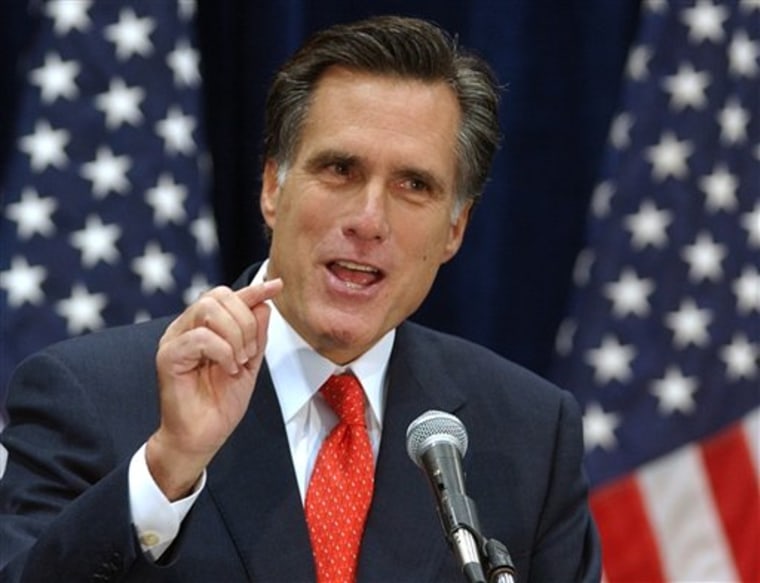Massachusetts Gov. Mitt Romney took the initial step in a 2008 presidential bid, another hopeful in a crowded Republican field headlined by the party's more familiar names of John McCain and Rudy Giuliani.
The governor filed papers to create an exploratory committee just an hour before he left the Statehouse for the final time on Wednesday, concluding his one and only term in elective office. Democrat Deval Patrick will succeed Romney on Thursday.
"After talking to my family, I have decided to take this initial step of forming an exploratory committee in order to raise the resources and build the campaign organization required to pursue the highest office in our country," Romney said in a statement.
The candidate's pedigree
If elected, Romney would become the first Mormon president. The 59-year-old former venture capitalist is the son of former Michigan Gov. George Romney, who waged a short-lived campaign for the Republican nomination in 1968.
In opinion polls, McCain, the Arizona senator and 2000 candidate, and former New York Mayor Giuliani often share the top spot while Romney, best known for his work on the 2002 Winter Olympics, registers in single digits. But the governor has taken similar steps in pursuing the presidency, hiring staff and establishing a fundraising base a full year before the first primary votes are cast.
"Given his pedigree," said Richard Bond, a former chairman of the Republican National Committee and declared backer of McCain, "he is a serious candidate."
Other Republican candidates include Kansas Sen. Sam Brownback and former Wisconsin Gov. Tommy Thompson, who have established exploratory committees. California Rep. Duncan Hunter and former Virginia Gov. Jim Gilmore have said they intend to follow suit. Others said to be mulling a bid include Arkansas Gov. Mike Huckabee, New York Gov. George Pataki, Nebraska Sen. Chuck Hagel, and former Oklahoma Gov. Frank Keating.
Credentials questioned
In recent weeks, Romney has faced questions about his conservative credentials on issues such as gay rights and abortion. Romney challenged Democratic Sen. Edward Kennedy in 1994, and in a letter he promised a gay Republican group he would be a stronger advocate for gays than his rival.
Romney ran as a moderate during his gubernatorial campaign. Despite saying he personally opposed abortion, he not only pledged to leave the state's abortion laws intact, but noted his mother, Lenore, ran for U.S. Senate in Michigan in 1970 as a supporter of abortion rights.
He now stresses his opposition to abortion in speeches across the country.
In 2002, Romney's supporters also handed out fliers with well wishes from him and his running mate at Boston's annual Gay Pride Parade. And he was endorsed by the Log Cabin Republicans, a group of gay party activists.
Nonetheless, Romney has insisted his opposition to gay marriage has been unflinching. He has lambasted the Supreme Judicial Court for its November 2003 decision making Massachusetts the first state to legalize gay marriage.
"While Mitt Romney says he's not a multiple-choice candidate, his record shows that he has routinely changed his position on everything from abortion to taxes, making it difficult to know where he stands," said Democratic National Committee spokeswoman Stacie Paxton.
Professional background
Willard Mitt Romney received his B.A. in 1971 from Brigham Young University, where he was class valedictorian, and then went on to simultaneously earn degrees from Harvard Business and Law schools, graduating cum laude from law school and in the top 5 percent of his business school class.
The Michigan native remained in Boston, where he helped found a multibillion-dollar venture capital firm, Bain Capital, and amassed a multimillion-dollar fortune funding such companies as Staples, the office-supply giant.
His only major failure was an unsuccessful campaign in 1994 against Sen. Edward M. Kennedy, D-Mass. Romney rebounded politically in 2002, when he won the governor's office.
Romney sought and won the chairmanship of the Republican Governors Association, which allowed him to spend the 2006 midterm elections traveling the country and dispensing cash to his party's gubernatorial candidates.
He raised a record $20 million and was especially generous with RGA money in early presidential states like Iowa, Florida and his native Michigan.
